Sea sponges offer lifeline to women in Zanzibar
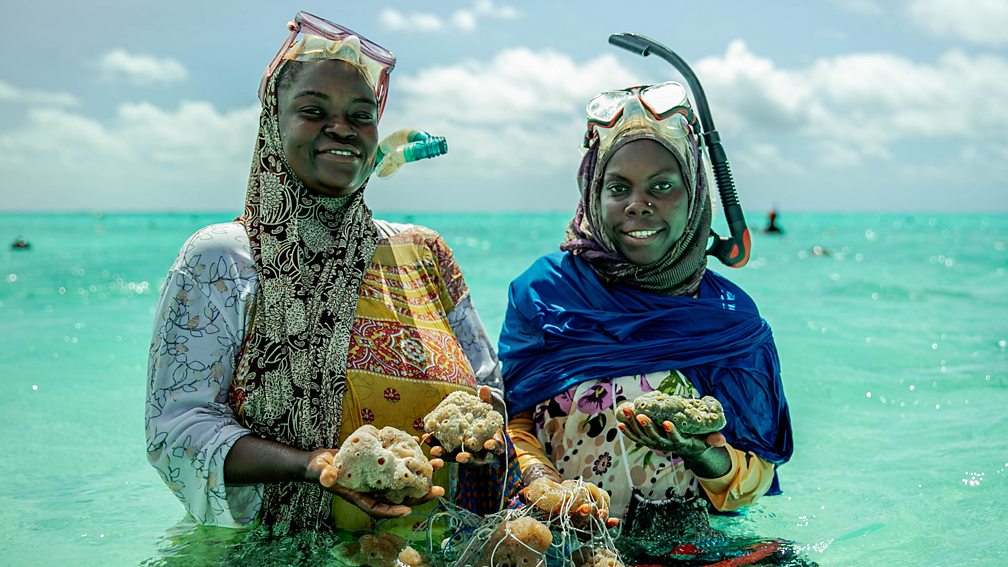
As ocean temperatures rise, single mothers and divorced women in Zanzibar switch from seaweed to sea sponge farming to stay afloat.
As a gentle morning breeze blows across the Zanzibar shore, Hindu Simai Rajabu walks through knee-deep water to reach a shallow lagoon off the coast of Jambiani, Tanzania, where her floating sponge farm is located.
Sporting shiny goggles and with a snorkel placed on top of her headscarf, Rajabu wades through the Indian Ocean, her laughter at the experience of being filmed mingling with the sound of the crashing waves.
As the tide rises, the 31-year-old mother of two swims and submerges to the depth of the buoys which hold the floating sponge farm in place.
The quest for prosperity has led Rajabu and 12 other divorced women and single mothers from Zanzibar's Jambiani village into the Indian Ocean to grow climate-resilient sponges.
Farming sea sponges has become a lucrative business for these women in recent years. Many women in Jambiani farm seaweed, but low yields due to rising sea temperatures have started to make it to earn a living. In 2009,some women began switching to growing puff-like soft sea sponges: primitive aquatic animals that, when harvested, are used for bathing and cleaning.
Sea sponges are more resilient to warmer temperatures and filter pollutants such as sewage and pesticides out ofthe water.
Local women's rights activists say sea sponge farming is helping to improve gender equality in Zanzibar and has lifted these women out of poverty. The farmers themselves say their quality of life has improved.
This article in the Climate Guardians series was supported by funding from the European Journalism Centre, through the Solutions Journalism Accelerator. This fund is supported by the Bill & Melinda Gates Foundation.
When Rajabu reaches the buoys, she adeptly propels herself forward to inspect the juvenile sponges on the ropes. She briskly starts scrubbing a thick polyethylene rope with a clasp knife and removes lurking bacteria from baby sponges bobbing there.
"The sponges are delicate animals; if I don't clean them well they will die," says Rajabu, as she handles them carefully, taking care not to squeeze them.
To prevent the sponges from becoming overheated by the sun or damaged by motorboats, Rajabu ensures they always remain underwater.
She spends four hours every day in the ocean, tending to the farm. In the afternoon, she goes to the office to sort and label dried sponges for sale.
Rajabu dropped out of school when she was 17 because her mother could no longer afford to pay for her studies, crushing her dream of becoming a doctor. When her husband left her after nine years, Rajabu refused to be defined by her circumstances. She started seaweed farming to support her two children.
But she barely earned enough to support them – a mere 70,000 Tanzanian shillings (£22/$28) each month.
In 2020, Rajabu approached Marine Cultures to explain her difficult situation and seek a job. She was swiftly taken on board and started earning a higher income.
"It is a tough job, but I enjoy doing it and it pays quite well," she says. She now earns a monthly salary of 250,000 Tanzanian shillings (£80/$100).
"I earn a stable monthly income, enough to meet my family's needs," she says.
Sea sponges have a shell-like layer, riddled with tiny pores which allows water to flow in and out. The marine creatures are thought to have existed for over 600 million years. Scientists have identified over 15,000 species globally.
Marine Cultures, a Swiss non-profit, established sponge farming in Zanzibar in 2009 to enable poor women to earn a better income and help protect the region's natural resources.
"I thought it is a good thing to cultivate the sea, not only to take things out, without giving something back," says founder Christian Vaterlaus.
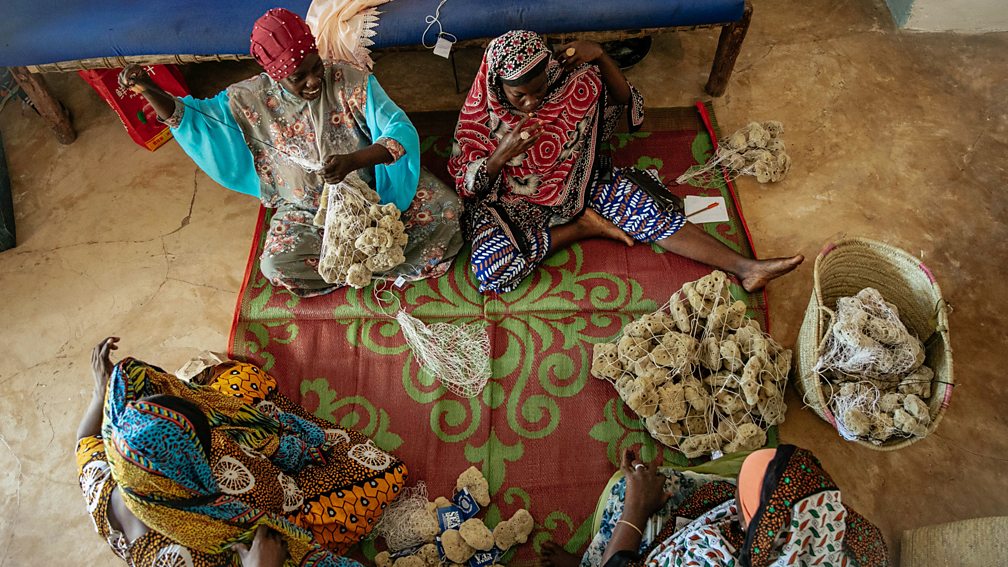
Until the early 2000s, the seaweed industry was a backbone of Zanzibar's local economy, employing 20,000 women farmers, lifting their standard of living and social status. But the seaweed industry has been battered by rising temperatures, says Vaterlaus, threatening the livelihoods of thousands of farmers in Zanzibar.
A 2021 study by researchers at the University of York in the UK found seaweed yields and quality had dropped drastically in the area due to rising temperatures, stronger winds and erratic rainfall.
Despite early gains, the production of seaweed fell by 47% between 2002 and 2012 due to climate change, disease and the decrease of the number of farmers due to low prices, the researchers concluded.
"I found the prices of seaweed are low and the people don't earn good money," says Vaterlaus.
In his bid to help cash-strapped seaweed farmers in Jambiani, Vaterlaus introduced the idea and method of growing sponges to the area.
Seaweed is highly vulnerable to climate change, but sponges can tolerate warmer temperatures, allowing them to thrive in hot conditions, Vaterlaus adds.
"During the hot season, it is hard to produce seaweed but sponge farming is still possible," he says.
Aziza Said, a marine biologist at the University of Dodoma in Tanzania, agrees that sponges are more resilient to hotter temperatures, adding that they also require less maintenance and fetch a higher market price than seaweed.
By providing an alternative to fishing, sponges also reduce pressure on natural resources and protect the environment, Said says. And they enrich the sea bed by spitting out fatty and amino acids for other organisms to absorb, she adds.
Research has also shown that the spongy creatures play an important role themselves in combatting climate change. Sea sponges exist in all oceans around the world and make up 20% of the global silicon biological sink. Their skeletons break down into microscopic pieces of silicon, which helps control the carbon cycle in the ocean and reduces the greenhouse effect, experts say. Dissolved silicon is critical for the growth of diatoms, tiny organisms which absorb large amounts of CO2 in the ocean using photosynthesis.
According to Said, diatoms grow well when there's a large enough supply of dissolved silicon in seawater.
"When diatoms die, their shells sink to the ocean floor, effectively absorbing carbon in the form of organic matter and silica," she says.
Sea sponges also effectively filter sea water and reduce marine pollution, according to another study. A single sponge can pump thousands of litres of water per day through a maze of channels and pores that trap impurities and organic substances, the researchers note.
According to another study, up to 24,000 litres (5,300 gallons) of sea water can be pumped through a 1kg (2.2lb) sponge in a single day.
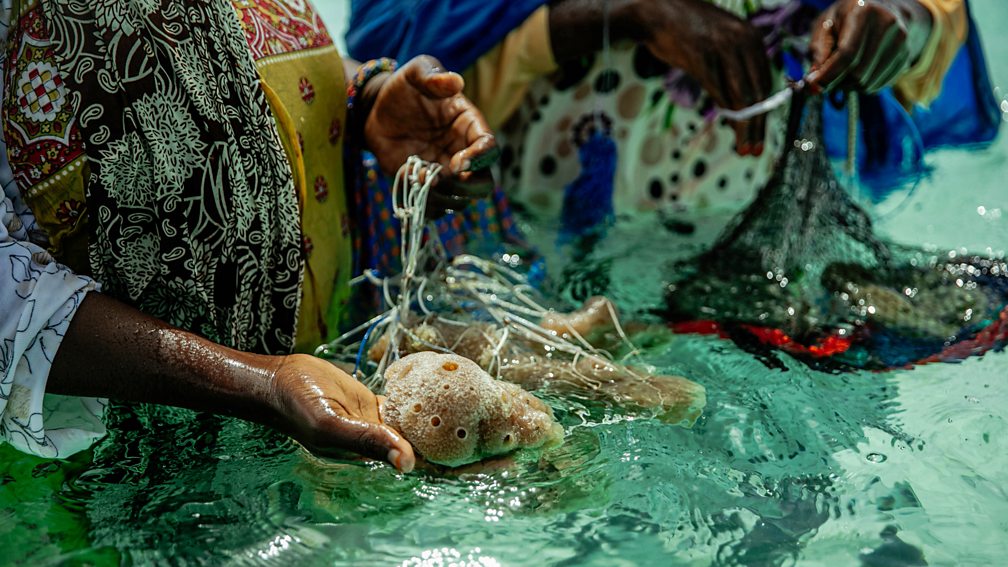
The women in Jambiani are trained by Marine Cultures before they start harvesting sea sponges.
Since 2009, 13 women have been trained, according to Ali Mahmudi Ali, who manages the farm.
"We train farmers for one year to ensure they have [the] necessary skills and knowledge to cope with the changing sea conditions," he says.
The training involves teaching the women to swim, dive, use the equipment and gear, how to clean and care for the sponges, book-keeping, marketing and grading the sponges for sale, he says.
Each sponge is sold for 37,000-74,900 Tanzanian shillings (£12-£24/$15-$30), depending on its size and quality. They are sold to souvenir shops, tourists and hotels in Zanzibar and abroad.
The farmer receives 70%, while 29% goes to the shop and 1% to Zanzibar's Sponge Farmers' Cooperative, a women-led organisation which oversees the recruitment of the farmers and production activities.
Sponge farming is helping to redefine traditional gender roles in the Jambiani community of more than 1,400 women who are traditionally confined to childcare and domestic chores, and has ushered in a financially stable future for the women involved, says Nasir Hassan Haji, a female sponge farmer and chair of the farmers' cooperative.
"[It] has improved farmers' incomes significantly. We are very proud of this initiative," says Haji, a 48-year-old mother of four.
She says that sponge farming has helped the women to break free from financial dependence on men, which made them vulnerable to exploitation and abuse. "As women, we should take charge of our own lives. We should not just wait for our husband to bring food on the table," Haji says.
Now that they are earning a steady income, their influence in family decision-making has increased, she adds.
Carbon Count
The emissions it took to report this story were 30kg CO2. This covers the emissions from the car journey, but not the ferry to Jambiani (110km) due to a lack of available data. The digital emissions from this story are an estimated 1.2g to 3.6g CO2 per page view. Find out more about how we calculated this figure here.
Rajabu's hard work as a sponge farmer has paid off. In just two years, she has earned enough money to buy a plot of land on which she is building a three-bedroom house.
"I want to stay with my children in my own house," she says.
Rajabu says her rapid economic rise has sparked curiosity among her neighbours. "I was a laughing stock when I started, but now those who were laughing ask me how I managed to build a house," she says.
Like Rajabu, Haji finds sponge farming far preferable to the seaweed farming she used to do. For 15 years she hauled heavy seaweed from the sea, facing a harsh reality of extreme weather.
"It was hard to walk through strong winds, carrying seaweed on my head," she says. "The dripping salty water irritated my eyes."
However, sponge farming has brought in money and made her smile, she says. "The only secret is to work hard. Hard work pays."
Zulfa Abdalla says she was struggling to eke out a living.
She was left to care for two children after her husband divorced her when she was 23.
Abdalla's former husband remarried and never supported his children, leaving her to raise them singlehandedly, she says.
She turned to hat weaving to earn money. However, the monthly income of 40,000 Tanzanian shillings (£13/$16) was insufficient to meet her growing family's needs.
When Abdala found a job as a sponge farmer, she had to learn to swim.
"I was scared of the sea, but I learned how to swim," she says.
Within three months of starting as a sea sponge farmer, Abdalla produced a bumper harvest, which earned her 1,600,000 Tanzanian shillings (£513/$639). This success enabled her to buy a bed, dressing table and wardrobe.
Her income also allowed her to renovate her mother's house.
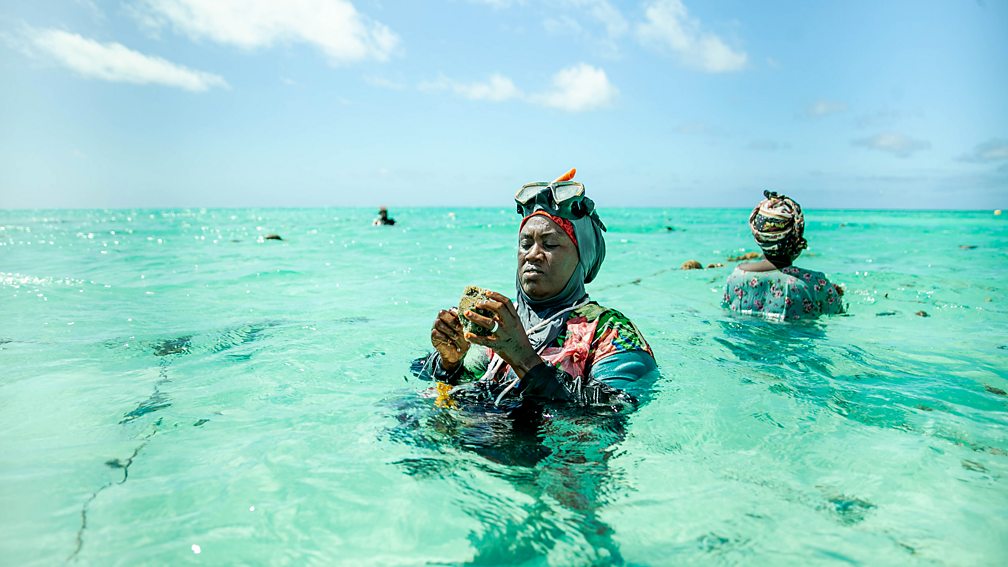
The global sea sponge market extends well beyond Zanzibar, with thriving cultivation and harvesting in various regions worldwide, including the Federated States of Micronesia and Tunisia. These sought-after sponges, valued for their natural beauty and sustainability, serve as natural alternatives to synthetic sponges and are widely used in households globally.
Marine Cultures plans to expand sponge farming to other regions in Zanzibar and across Tanzania, says Ali. Due to its lucrative nature, sponge farming offers an alternative to fishing and helps reduce stress on coastal ecosystems, he says.
It can also provide an eco-friendly alternative to harmful synthetic sponges, which contain microplastics that may harm aquatic life, he adds.
In some areas of the world, however, there are concerns around overharvesting of the natural sea sponges found in the ocean. Sea sponge farming offers an alternative but scaling it up also presents challenges.
Vaterlaus says the growth of the sea sponge industry faces obstacles due to a lack of financial resources for research and investments as well as limited expansion of hatcheries to grow baby sponges. "As long as we cannot cultivate a lot of small sponge babies we cannot scale up," he says.
The real economic impact of the sponges is low due to scalability problems, he adds. "It was slow [initially] because for every farmer we need 1,000-1,500 sponges so they have their own brood stock to cultivate the seed for their independent production."
Climate Guardians
Future Planet's series Climate Guardians spotlights the stories of those on the frontline of the climate crisis. Using on-the-ground, local reporting, it delves into the climate solutions being pioneered by women and indigenous communities in the Global South to learn what they can teach the rest of the world. It also investigates how they can alleviate other problems such as gender inequality, food insecurity, health and poverty.
Despite the environmental benefits of sponge farming, production and distribution is challenging due to high costs, says Leonard Chauka, a molecular biologist from the Institute of Marine Sciences at the University of Dar es Salaam in Tanzania.
While synthetic sponges are cheap and widely available, natural sponges are expensive, costing up to 75,000 Tanzanian shillings (£24/$30). Chauka suggests that increased public awareness about the environmental risks of plastic products will help promote the use of natural sponges.
Growing sea sponges is also a lengthy process, however. Farmers must wait a full year for the sponges to grow to maturity and are very reliant on the availability of natural seeds. "Sponge farmers rely only on the collection of seeds from the natural environment. I think research efforts should focus on developing fast-growing and high-quality sponge varieties," says Chauka.
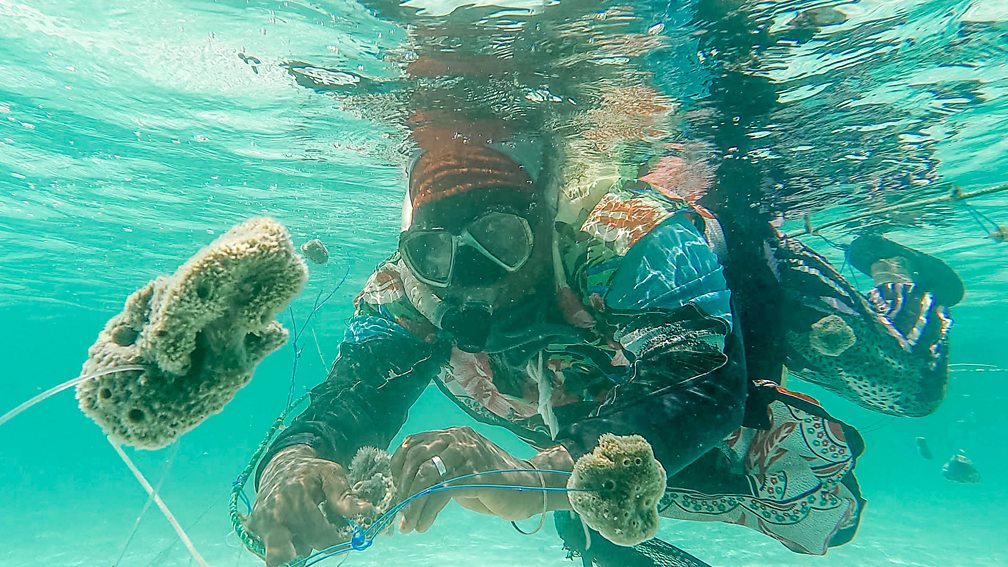
Research has also indicated that some sea sponges are susceptible to marine heatwaves.
Despite these challenges, the market for Zanzibar sponges is good, Vaterlaus says. He says that Marine Cultures plans to introduce sponge farming on Pemba Island and the coastal city of Tanga later this year.
"We have many potential customers worldwide," he says.
As a call for prayer from a nearby mosque echoes in the air, Mkasi Abdalla says sponge farming has caused ripples of excitement in her community.
"I am very grateful for this opportunity. The income I get helps me to solve my problems," says Abdalla, who earns 270,000 Tanzanian shillings (£87/$108) every month from selling sponges.
With her savings, she has bought a plot of land to build her dream home.
Like Rajabu, Abdalla's life has been a rollercoaster. After her first husband died, Abdalla, a former seaweed farmer and mother to seven children, became the breadwinner for her family.
But her situation improved when she remarried a pottery artist who supported her cause.
"I am happy to bring together my new husband and all my children," she says.
The story of Abdalla and other women shows the power of sponge farming, providing economic independence and gender equality, while conserving marine ecosystems.
"I work tirelessly to earn money so that my children can receive better education and succeed in life," says Rajabu. "I want to break the cycle of ignorance in my family."
--
This article was updated on 18/09/2023 to clarify that sea sponge farming takes place in Micronesia and Tunisia, not in the Mediterrenean or the Carribean as previously stated.
Join one million Future fans by liking us on Facebook, or follow us on Twitter or Instagram.
If you liked this story, sign up for the weekly bbc.com features newsletter, called "The Essential List" – a handpicked selection of stories from BBC Future, Culture, Worklife, Travel and Reel delivered to your inbox every Friday.




